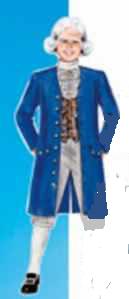George Washington
George Washington, the first President of the United
States, led a varied career. He was a surveyor, Freemason, Virginia
planter, military officer, revolutionary, a slave owner, politician,
step-father, and husband. Some referred to him as a Cincinnatus, the
victorious Roman general who, after the necessary fight to save Rome was concluded,
packed up his sword and returned to his life as a farmer rather than accept
the rule of Rome. To others, he was an opportunistic elitist.
Though much has been written about the man, some things are generally agreed
upon. He set the tone for the future presidents of the US, refusing
any titles but republican ones (thus, presidents are referred to as 'Mr. President'
instead of 'Your Royal Highness'.) He held regular cabinet meetings
to avoid any suggestion of sole rule. Even Thomas Jefferson, who did
not always think highly of him said of Washington, 'The moderation and virtue
of a single character probably prevented this Revolution from being closed,
as most others have been, by a subversion of that liberty it was intended
to establish' Washington established the unwritten policy (until Franklin
Roosevelt) of any individual holding a maximum of two presidential terms,
though this implied policy, nor the passing of the 22nd Amendment to the
Constitution in 1947, did not seem to stop some families from establishing
political dynasties which have become the norm for the US political system.
During Washingtons terms, the US strived to establish itself as a nation
among nations and sought to avoid entanglements in foreign wars. It
was a tricky task at the time. France was fighting its own Revolutionary
war and Britain was ready to pounce on its ex-colonies if the opportunity
arose. After two terms as president, he retired to his Virginia home,
Mount Vernon, and built the largest distillery in the US, producing corn and
rye whiskey and fruit brandy. After a ride in the freezing rain, 1799,
he contracted pneumonia and died on December 14, 1799, his passing greatly
aided, it is now thought, by the 1799 state of the art medical treatment he
received.
He is still referred to as The Father of His Country 'First in war, first
in peace, first in the hearts of his coutnrymen'


